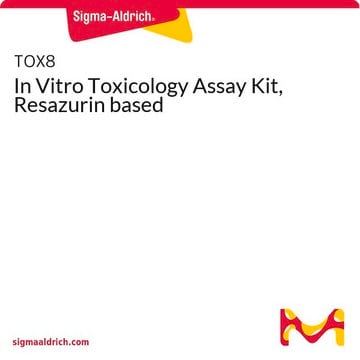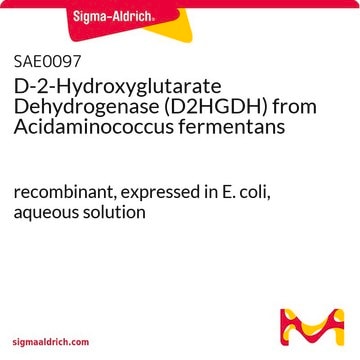199303
Resazurin sodium salt
certified by the Biological Stain Commission
Synonym(s):
7-Hydroxy-3H-phenoxazin-3-one-10-oxide sodium salt
About This Item
Recommended Products
grade
certified by the Biological Stain Commission
Quality Level
form
powder
composition
Dye content, 75%
solubility
1 M NH4OH: 1 mg/mL
λmax
380 nm (2nd)
598 nm
application(s)
diagnostic assay manufacturing
hematology
histology
storage temp.
room temp
SMILES string
[Na+].[O-]c1ccc2c(OC3=CC(=O)C=CC3=[N+]2[O-])c1
InChI
1S/C12H7NO4.Na/c14-7-1-3-9-11(5-7)17-12-6-8(15)2-4-10(12)13(9)16;/h1-6,14H;/q;+1/p-1
InChI key
IVGPGQSSDLDOLH-UHFFFAOYSA-M
Looking for similar products? Visit Product Comparison Guide
General description
Application
- the measurement of metabolic activity and the proliferation of living cells
- the detection of bacterial reduction in milk
- in viability assays as a component of culture media for the detection of viable bacteria
- to determine the number of motile sperm in sheep semen
- to assay lactate dehydrogenase
- as an analytical reagent to quantify L-glutamate
Signal Word
Warning
Hazard Statements
Precautionary Statements
Hazard Classifications
Eye Irrit. 2 - Skin Irrit. 2 - STOT SE 3
Target Organs
Respiratory system
Storage Class Code
11 - Combustible Solids
WGK
WGK 3
Flash Point(F)
Not applicable
Flash Point(C)
Not applicable
Personal Protective Equipment
Choose from one of the most recent versions:
Already Own This Product?
Find documentation for the products that you have recently purchased in the Document Library.
Customers Also Viewed
Our team of scientists has experience in all areas of research including Life Science, Material Science, Chemical Synthesis, Chromatography, Analytical and many others.
Contact Technical Service












